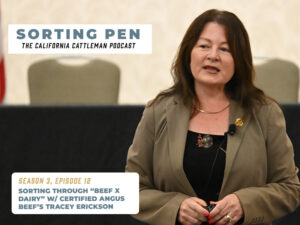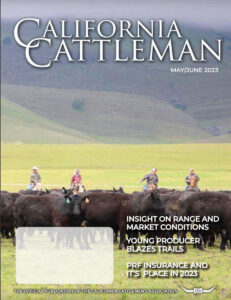
LEGISLATIVE BULLETIN
June 12, 2023
To read the full version each week, please subscribe below.
2023 Midyear Meeting
The last day to pre-register for Midyear Meeting is Friday, June 16. To register, click here. All registration prices will be increased onsite.
The California Cattlemen’s Association Room block at the Paso Robles Inn is open. To make your reservations call (805) 238-2660 and mention “California Cattlemen’s Association.” Further registration details and the tentative schedule can be found here.
State Legislature to Vote on 2023-24 Budget this Week
Thursday is the Constitutional deadline by which the State Legislature must pass a State Budget lest legislators forego their pay, and another Constitutional provision requires bills to be in print for 72 hours before they can be voted upon. At 8:30 last night the Legislature set itself up to hit those deadlines by publishing the Legislature’s version of the 2023-24 State Budget.
While legislators will almost certainly hit their constitutional deadline on Thursday, the initial 2023-24 State Budget will by no means be the last word on state funding. As Senate President Pro Tempore Toni Atkins and members of the Senate Committee on Budget and Fiscal Review noted in a document outlining the Legislature’s proposal this morning, “Just as it is understandable for the Legislature to not agree with every detail of the [Governor’s proposed budget], there should be no expectation for the Governor to agree to every detail of the June 15 Legislature’s version. So, while both the Executive and Legislative branches of government are…meeting their constitutional obligations, more work will be done to craft the Final Version of the Budget Act of 2023.”
Even after the “Final Version of the Budget Act of 2023” becomes law, negotiations may continue in subsequent “junior” budget bills amending the budget and via budget trailer bills.
Of initial note, the Legislature’s proposed Budget would approve the Governor’s May proposal to allocate an additional $290 million for flood protection efforts and includes funding for climate programs intended to benefit agricultural producers administered by the California Department of Food & Agriculture and California Air Resources Board, such as $100 million for the Funding Agricultural Replacement Measures for Emission Reductions (FARMER) Program and $35 million for methane emissions reduction efforts at CDFA.
As of press time, CCA staff had not completed a thorough analysis of the budget proposals published just last night. Stay tuned to Legislative Bulletin and CCA’s other publications next week and in the weeks that follow for more details on the State Budget and its potential impacts for cattle producers.
California Department of Fish & Wildlife Issues New Beaver Depredation Policy
The California Department of Fish & Wildlife (CDFW) last Monday released a new Beaver Depredation Policy. According to the document, the “policy…is intended to implement a deliberative, tiered approach when responding to reported beaver depredation” and “will promote the use of various nonlethal beaver damage deterrent techniques to resolve depredation conflicts where feasible.”
Unfortunately, CDFW did not consult with CCA staff as it undertook to develop the new “stepwise process for beaver depredation incidents.”
Under the policy, CDFW will initially respond to reports of property damage from beavers by educating the property-owner of “options to institute logistically and economically feasible corrective actions to prevent future occurrence of the beaver damage” in a deliberate attempt to “reduce requests for permits.”
Where a property-owner requests a take permit for problem beavers, the policy highlights that “take” under California law “means to hunt, pursue, catch, capture, or kill,” signaling the Department’s intention to promote non-lethal means of take. The policy also suggests that CDFW will condition take authorization on property-owners implementing non-lethal “corrective actions” to deter further beaver damage.
Politico summed up the tone of the Departments new beaver policy well, noting that the policy represents part of “a gradual statewide shift toward coexistence with nuisance animals like mountain lions and wolves.” For more information about the policy, see CDFW’s press release and beaver webpage.
CDFW Implements Pay for Presence Wolf Compensation Program
The California Department of Fish and Wildlife has announced the availability of its “Pay for Presence” wolf compensation program. Under the Pay for Presence program, producers may be eligible for compensation if they operate within a known wolf pack territory, and compensation is available retroactive to September 23, 2021. CDFW’s 2021-22 map of known wolf pack summer and winter ranges is available here, and the agency’s methodology for determining these geographic ranges can be found here. While the Department’s program does not reflect all CCA’s priorities and is by no means a perfect program, the availability of Pay for Presence compensation marks significant progress in compensating livestock producers who must bear the burden of ill-conceived state regulations fully protecting gray wolves. For more information, see last week’s edition of Legislative Bulletin.
Supreme Court Limits Scope of “Wetlands” Considered Jurisdictional Waters of the U.S.
The U.S. Supreme Court late last month issued its highly-anticipated ruling in Sackett v. EPA, significantly limiting the extent to which wetlands may be considered “Waters of the United States” (WOTUS) and thus under the regulatory jurisdiction of the Environmental Protection Agency and Army Corps of Engineers. A unanimous court rejected the established “significant nexus” test for determining when wetlands are sufficiently “adjacent” to other jurisdictional waters to themselves qualify as WOTUS, with a bare majority of justices determining that jurisdictional wetlands are limited to those which have “a continuous surface connection” with a traditional navigable water. The ruling is likely to necessitate revisions to the Biden Administration’s recent WOTUS Rule, which is partly rooted in the “significant nexus” test. For additional analysis, see the May 30 edition of Legislative Bulletin.
New Episode of Sorting Pen the California Cattleman Podcast
A new episode of Sorting Pen: The California Cattleman Podcast is out now! Certified Angus Beef’s Senior Executive Vice President of Marketing Tracey Erickson talks a little about the Certified Angus Beef Program and highlights from her presentation at CCA’s 2023 Feeder Meeting. To listen to the episode click here.
National Audubon Society Posts Job for Senior Outreach Coordinator
The National Audubon Society, a nonprofit conservation organization that protects birds and the lands they inhibit have posted a job opening for a Senior Outreach Coordinator. To learn more, click here.
California Agriculture Vision
The California Department of Food and Agriculture and California State Board of Food and Agriculture have announced their plan for Ag Vision for the Next Decade. Created using an inclusive process, the plan’s goal is to provide opportunity for California farmers, ranchers and communities and climate action.
The plan developed aims to focus on five key priority areas including:
- Fostering climate-smart, resilient, and regernative food systems.
- Building healthy, local communities.
- Driving next-generation talent and tools.
- Enhancing understanding of agriculture.
- Collaborating on smarter regulations.
To learn more about Ag Vision, click here. To view a video clip on Ag Vision, click here.
UC to Unearth 7 Years of Wildfire Impacts. Help Fight for Better Ag Resources and Policies
From the UCCE UC Davis
Has your ranch in California been impacted by wildfires? We hope you can take less than 20 minutes to share the impacts you experienced and response strategies you implemented. The results of this survey will elevate rancher perspectives to the forefront of local and regional wildfire preparedness & response efforts. All participants who finish the survey by June will receive a $20 thank-you gift and will be entered into a $200 drawing. This initiative is led by the University of California at Davis in collaboration with Cooperative Extension. Go to https://bit.ly/WildfiresAgStudyCCA to get started.
Upcoming CCA Events
Midyear Meeting
June 21-22, Paso Robles, CA, Paso Robles Inn
The last day to pre-register for Midyear Meeting is Friday, June 16. To register, click here. All registration prices will be increased onsite.
The California Cattlemen’s Association Room block at the Paso Robles Inn is open. To make your reservations call (805) 238-2660 and mention “California Cattlemen’s Association.” Further registration details and the tentative schedule can be found here.
CCA Cattle-PAC Auction + Dinner
Sept. 16, Paso Robles, CA
Upcoming Industry Events
California-United Water 2023 Silicon Valley Tour
June 21-23, 2023, Santa Clara, CA
The Mountain Counties Water Resources Association (MCWRA), Urban Water Institute, Inc., Mesa Water, and Bay Area Water Supply & Conservation Agency (BAWSCA) are hosting a tour in Santa Clara, CA. Tour stops include Google, Levi’s Stadium and much more. For more information and to register, click here.
2023 Cattle Industry Summer Business Meeting
July 24-26, 2023, Manchester Grand Hyatt, San Diego, CA
Registration for the 2023 Cattle Industry Supper Business Meeting is now open. To register, click here. To view the agenda, click here.
Industry News
Coalition Seeks Withdraw of BLM’s Proposed Rule Rural Radio “The Public Lands Council – of which the American Sheep Industry Association is a member – submitted two letters this week to the Bureau of Land Management expressing concerns about a proposed rule that would greatly affect grazing on public lands. The following letter was submitted on behalf of sheep and cattle grazers from all across the Western United States.” To continue reading, click here (Editor’s Note: CCA is a signatory to the letter reported in this story).
Cows help reduce wildfire risk, restore native habitats in eastern Orange County The Orange County Register “Among climate advocates, beef typically gets a bad rap.To stock feedlots for factory-farmed cattle, which is how 70% of America’s cows are raised, crews often clear forests and use lots of water to grow grain. And once those cows eat, their burps and flatulence and decomposing manure emit high levels of planet-warming greenhouse gases.” To continue reading, click here.
California ranchers intentionally violated an emergency water order. Now lawmakers want to triple the fines CAL MATTERS “When ranchers violated an emergency order to stop pumping water from the drought-plagued Shasta River last year, state officials fined them $4,000, or roughly $50 each. Now California legislators are weighing a bill that would triple fines for such infractions — and could allow the penalty to climb higher than a million dollars.” To continue reading, click here.
A New episode of Sorting Pen: The California Cattleman Podcast is out now. Certified Angus Beef’s Senior Executive Vice President of Marketing Tracey Erickson talks a little about the Certified Angus Beef Program and highlights from her presentation at CCA’s 2023 Feeder Meeting. To listen to the episode click here.



